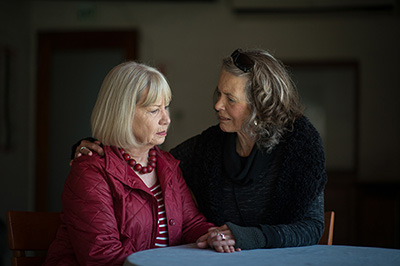Checking On Elderly Loved Ones During the Holidays
 The holiday season offers opportunities to visit and reconnect with parents and other elderly family members. These visits can also be a good time to ensure that your elderly relatives are safe, healthy, and happy.
The holiday season offers opportunities to visit and reconnect with parents and other elderly family members. These visits can also be a good time to ensure that your elderly relatives are safe, healthy, and happy.
Getting a picture of your loved one’s overall wellness means more than observing their physical wellness. Here’s a checklist to guide you during these visits. The goal is to balance your concern for their safety with their right to independence, making your holiday visits both meaningful and productive.
1. Physical health
- Observe physical condition: Look for signs of weight loss, frailty, or fatigue, which might indicate health issues. Are they getting appropriate exercise?
- Mobility: Notice how they move around. Struggling with balance or walking could signal physical decline.
- Living conditions: Is their living space safe and comfortable? Check for trip hazards, adequate heating and lighting, and cleanliness.
- Medications: Verify that they are correctly taking their prescribed medications.
2. Mental and emotional wellness
- Cognitive function: Be alert to any signs of memory lapses or confusion, as these can be early signs of dementia.
- Mood changes: Watch for symptoms of depression or anxiety, such as withdrawal from activities they once enjoyed.
3. Financial safety
- Financial management: Gently inquire about how they are managing their finances. Look for unopened mail or unpaid bills.
- Scam awareness: Discuss potential scams, especially those targeting seniors, and ensure they know how to protect themselves.
- Banking review: If appropriate, check for any unusual banking activities that might suggest financial exploitation.
4. Household management
- Routine maintenance: Are household chores and maintenance up to date? Overdue tasks can indicate declining ability.
- Food and essentials: Ensure there’s enough food and essential supplies. Poorly stocked kitchens can be a sign of neglect or mobility issues.
- Assistive devices: Check if they have any needed assistive devices, like hearing aids, and that these are functioning properly.
5. Social and community connections
- Social interactions: Understand their level of social interaction. Isolation and loneliness have been shown to affect both mental and physical health.
- Community services: Discuss and explore local community services and support systems that might be beneficial for them.
Additional considerations
- Open discussions: Have honest and respectful conversations about their needs, preferences, and any concerns they might have. If they haven’t already, suggest it may be time to designate a healthcare power of attorney and a financial power of attorney.
- Plan for emergencies: Ensure there is a plan in place for emergencies, including contact information and medical directives.
- Follow-up actions: After your visit, plan for follow-up actions, whether it’s arranging for additional help or planning regular check-ins.
If you are concerned about your loved one’s well-being, remember that it’s important to respect their autonomy. No matter how tactfully you bring up the topic of their ability to continue living independently, you might encounter resistance from them. Approach these moments with kindness and patience, and defer to their wishes and preferences.
